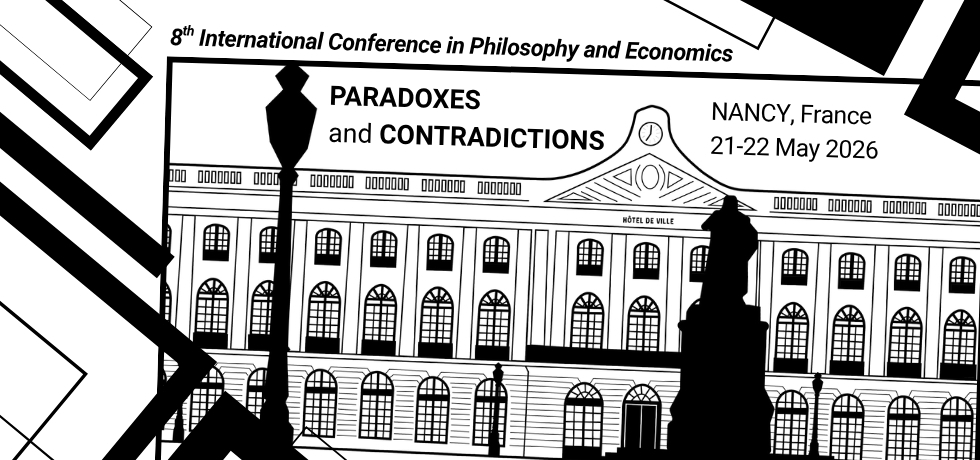
|
PRESENTATION The 8th International Conference in Philosophy and Economics will be held in Nancy at the University of Lorraine on 21-22 May 2026 on the theme of Paradoxes and Contradictions. Submissions on any topic at the intersection of philosophy and economics are welcome.
KEYNOTE SPEAKERS Keynote addresses will be delivered by
Prof. Nancy Cartwright Prof. Elizabeth Maggie PennDurham University Emory UniversityUniversity of California San Diego
CALL FOR PAPERS Paradoxes and Contradictions Paradoxes and contradictions are not merely curiosities or intellectual games—they often serve as catalysts for theoretical innovation, critical reflection, and methodological breakthroughs. Whether encountered in mathematical reasoning, empirical modeling, decision theory, or policy analysis, they compel us to confront the limits of coherence, consistency, and the explanatory power of economic knowledge. Some classical paradoxes have puzzled philosophers for centuries, such as the Liar paradox, the Sorites paradox, and Zeno’s paradoxes. Some paradoxes illustrate the difficulty of reconciling our intuitions and perceptions of space and time with scientific knowledge, such as Schrödinger's cat in quantum physics or the twin paradox in relativity theory. Paradoxes also function rhetorically, drawing attention or prompting the search for explanation. As when John Locke observed that the “king of a large and fruitful territory [in the Americas] feeds, lodges, and is clad worse than a day-labourer in England.” Combining direct observation with reported facts, 18th- and 19th-century political economists imagined a puzzle world. From Bernard Mandeville’s Private Vices, Publick Benefits, to the paradox of thrift conceptualized by John Neville Keynes and later Paul Samuelson, the tension between individual behavior and aggregate outcomes has proved to be a particularly fruitful line of inquiry for economists. For Hegel, the history of thought produces contradictions that are overcome through a dialectic process whereby a new form arises that contains the contradiction within it. Marx turned Hegel’s logic on its head, claiming instead that contradictions were located in the material world, in the capitalist production system. However, most economic paradoxes reveal tensions within the world of theory. From the simple Giffen paradox to the Edgeworth paradox, and the more complex paradoxes of capital theory, they expose hidden assumptions, challenge established theories, and invite adjustments, corrections, or displacements. Some paradoxes strike at the heart of the theory of value, such as the diamond–water paradox, the paradoxes of Malestroit, the Lauderdale paradox, and the paradox of caring labor. As individual choice became the dominant methodological lens in the second half of the twentieth century, economists became interested in deviations from the canon of rationality (e.g., the St. Petersburg paradox, Allais paradox, Ellsberg paradox, and the chain store paradox). Theoretical puzzles received increasing attention as they were brought into the laboratory. Broader normative characterizations of human nature have also long confronted paradoxes from Immanuel Kant’s “unsocial sociability” to John Stuart Mill’s paradox of hedonism. Economists and philosophers are also interested in political tensions such as the value conflicts identified by Amartya Sen in his liberal paradox, the tension between tradition and institutional change in James Buchanan’s paradoxical reference to “relatively absolute absolutes”, or the limitations of utilitarianism identified by Derek Parfit’s mere addition paradox. The problem of aggregating individual choices is foundational for social choice theory, as crystallized in a series of formal contradictions: Condorcet’s paradox, Kenneth Arrow’s impossibility theorem, Antony Downs’ paradox of voting, the Gibbard–Satterthwaite theorem, the doctrinal paradox, etc. Not all paradoxes reside in the theoretician’s mind. Painstaking data collection and statistical analysis have revealed surprising puzzles that challenge our understanding of economic change, such as the Jevons paradox, the Leontief paradox, Dutch disease, the productivity paradox, and the Easterlin paradox. Finally, policy recommendations based on economic constraints on political action are forcefully captured by Robert Bork’s Antitrust Paradox, Baumol’s cost disease, the Triffin dilemma, the Mundell–Fleming trilemma, or Dani Rodrik’s political trilemma. We welcome contributions that explore paradoxes and contradictions from any perspective—formal, conceptual, historical, or normative. Interdisciplinary approaches are particularly encouraged, as are critical perspectives that interrogate the role of contradiction in the construction of economic knowledge. Topics may include, but are not limited to:
While the conference theme is Paradoxes and Contradictions, we also welcome submissions on any topic at the intersection of philosophy and economics. The conference aims to provide a rich and inclusive forum for dialogue across a wide intellectual spectrum.
Submission Guidelines We invite abstracts in English or French of 200 to 600 words, clearly outlining the paper’s thesis, argument, and relevance to the conference theme or broader interdisciplinary conversations. We particularly welcome early-career researchers. Please submit your abstract before 31 December 2025 via the conference website. Decisions will be communicated by 22 February 2026. Full papers are expected by 1 May 2026. We also invite submissions of full sessions or panels on any topic connecting economics and philosophy in innovative ways. Proposals for full sessions should include a title, a short (around 300 words) description of the session, and the list of proposed papers, indicating authors’ names, affiliations, and titles of the contributions. Session proposals should be submitted via email at philoeco2026@sciencesconf.org. Each paper should also be submitted on the conference website and will be evaluated by the scientific committee.
Keynotes & Language Nancy Cartwright and Elizabeth Maggie Penn will deliver keynote addresses in English, as will most parallel sessions. At least one parallel session per block will be held in French.
Location The conference, organized by the BETA research institute in collaboration with the Archives Henri-Poincaré, will be held at the Faculty of Law, Economics, and Management of the University of Lorraine (13 Place Carnot, 54000 Nancy). A welcoming cocktail will be held on Wednesday, 20 May, on the evening before the conference. The conference social dinner will be held at the Hôtel de Ville, on the stunning Place Stanislas, a UNESCO World Heritage Site. |
CONTACT DATES Submissions open: 17 October 2025 Submission deadline: 31 December 2025 Extended deadline: 16 January 2026 Acceptance notice: 22 February 2026
Welcome reception: 20 May 2026, evening Sessions start: 21 May 2026, morning Sessions end: 22 May 2026, evening
REGISTRATION FEES Opening of registration and payment of conference fees: February 25, 2026 Fees TBA Closing of registration and payment of fees: May 1, 2026
Processing of personal data |



